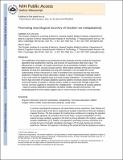| dc.contributor.author | Cho, Kathleen K. | |
| dc.contributor.author | Bear, Mark | |
| dc.date.accessioned | 2012-02-22T20:20:50Z | |
| dc.date.available | 2012-02-22T20:20:50Z | |
| dc.date.issued | 2010-01 | |
| dc.date.submitted | 2010-11 | |
| dc.identifier.issn | 1479-6708 | |
| dc.identifier.issn | 1748-6971 | |
| dc.identifier.uri | http://hdl.handle.net/1721.1/69159 | |
| dc.description.abstract | The modification of synapses by neural activity has been proposed to be the substrate for experience-dependent brain development, learning, and recovery of visual function after brain injury. The effectiveness or ‘strength’ of synaptic transmission can be persistently modified in response to defined patterns of pre- and post-synaptic activity. Well-studied examples of this type of synaptic plasticity are long-term potentiation and long-term depression. Can we exploit the current understanding of these mechanisms in order to strengthen brain connections that may have been weakened or impaired by sensory deprivation, disease or injury? Theoretically motivated research in the visual cortex has suggested ways to promote synaptic potentiation. The theoretical concept is that the type and extent of synaptic plasticity caused by patterns of activity depend critically on the recent prior history of synaptic or cellular activity. Studies in visual cortex strongly support this concept, and have suggested a mechanism for ‘metaplasticity’ – the plasticity of synaptic plasticity – based on activity-dependent modification of NMDA-receptor structure and function. The knowledge gained by these studies suggests ways in which recovery of function can be promoted. | en_US |
| dc.description.sponsorship | National Institutes of Health (U.S.) (NIH/NEI Grant RO1 EYO12309) | en_US |
| dc.language.iso | en_US | |
| dc.publisher | Future Medicine Ltd. | en_US |
| dc.relation.isversionof | http://dx.doi.org/10.2217/fnl.09.62 | en_US |
| dc.rights | Creative Commons Attribution-Noncommercial-Share Alike 3.0 | en_US |
| dc.rights.uri | http://creativecommons.org/licenses/by-nc-sa/3.0/ | en_US |
| dc.source | PubMed Central | en_US |
| dc.title | Promoting neurological recovery of function via metaplasticity | en_US |
| dc.type | Article | en_US |
| dc.identifier.citation | Cho, Kathleen K.A., and Mark F. Bear. “Promoting Neurological Recovery of Function via Metaplasticity.” Future Neurology 5.1 (2010): 21–26. | en_US |
| dc.contributor.department | Massachusetts Institute of Technology. Department of Brain and Cognitive Sciences | en_US |
| dc.contributor.department | Picower Institute for Learning and Memory | en_US |
| dc.contributor.approver | Bear, Mark | |
| dc.contributor.mitauthor | Bear, Mark | |
| dc.contributor.mitauthor | Cho, Kathleen K. | |
| dc.relation.journal | Future Neurology | en_US |
| dc.eprint.version | Author's final manuscript | en_US |
| dc.type.uri | http://purl.org/eprint/type/JournalArticle | en_US |
| eprint.status | http://purl.org/eprint/status/PeerReviewed | en_US |
| dspace.orderedauthors | Cho, Kathleen KA; Bear, Mark F | en |
| mit.license | OPEN_ACCESS_POLICY | en_US |
| mit.metadata.status | Complete | |
